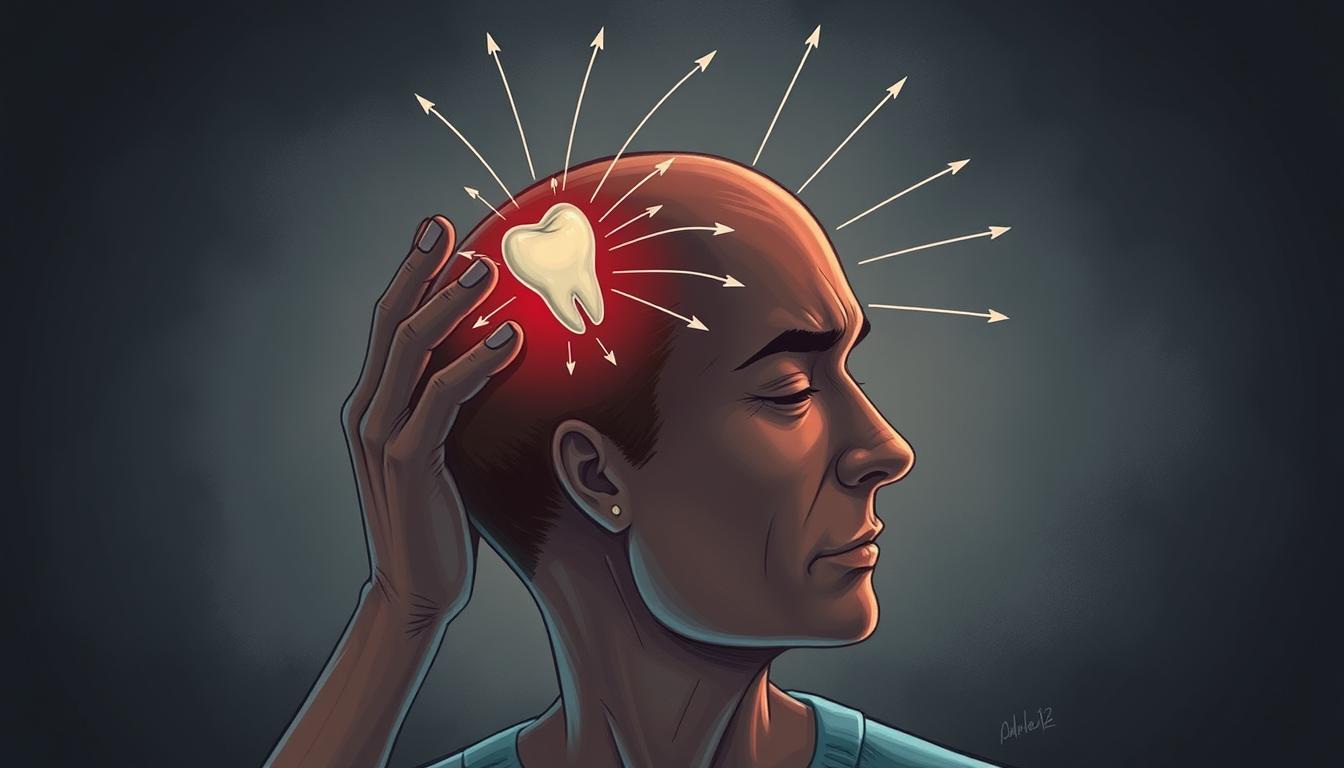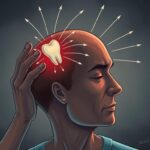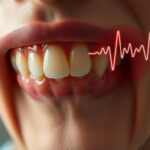Many people deal with both toothaches and headaches. But, it’s not always clear how they’re connected.The connection between dental pain and headaches is complex. Understanding this link is key to finding relief.
In this article, we’ll explore if a can toothache cause headache. We’ll also look at what this means for those with both conditions.
Key Takeaways
- The link between dental pain and headaches is more common than you think.
- Understanding the cause of your toothache is crucial to relieving headache symptoms.
- Dental issues can radiate pain to other areas of the face and head.
- Proper diagnosis is key to treating both toothaches and headaches effectively.
- Relieving toothache pain can often help alleviate headache symptoms.
The Connection Between Dental Pain and Head Discomfort
To understand the connection between toothaches and headaches, we need to dive into the science. The relationship between dental pain and headaches is complex. It involves multiple nerve pathways and pain signal transmissions.
Dental pain usually feels like it’s coming from the teeth or surrounding tissues. But, this pain can sometimes be felt in other parts of the face and head. This can lead to discomfort or pain that feels like a headache. The referral of pain from dental structures to the head is a well-documented phenomenon.
How Pain Signals Travel in the Face and Head
Pain signals from the dental region travel to the brain through a network of nerves. The main nerves involved are branches of the trigeminal nerve. This nerve is responsible for sensory innervation of the face.
| Nerve Branch | Area of Innervation | Role in Pain Transmission |
| Ophthalmic | Eye and surrounding area | Transmits pain signals from the eye and forehead |
| Maxillary | Upper jaw and teeth | Transmits pain signals from the upper teeth and maxillary sinus |
| Mandibular | Lower jaw and teeth | Transmits pain signals from the lower teeth and mandible |
The Trigeminal Nerve: The Common Link
The trigeminal nerve is often seen as the link between dental pain and headaches. Its wide innervation of the face, including the teeth, makes it crucial in pain signal transmission. This can lead to headaches.
trigeminal nerve
The complex relationship between dental pain and headaches highlights the importance of dental health in treating headaches. By understanding this connection, healthcare providers can offer better care.
Understanding Toothaches: Causes and Symptoms
Knowing the causes and symptoms of toothaches is key to figuring out if dental pain is linked to headaches. Toothaches can stem from many reasons. Spotting these can guide you to the right dental care.
Common Causes of Tooth Pain
Tooth pain can come from several sources. This includes tooth decay, gum disease, cracked teeth, and dental infections. Tooth decay happens when mouth bacteria damage the tooth enamel, leading to cavities and pain.
Other causes include gum recession, exposed roots, and teeth grinding. These can wear down the enamel and cause sensitivity.
How to Identify Different Types of Dental Pain
Dental pain can feel different, from sharp stabbing pains to dull aches. Sharp pain often points to tooth decay or a cracked tooth. Dull pain might mean a chronic issue like gum disease.
tooth pain causes and symptoms
| Type of Dental Pain | Possible Causes | Characteristics |
| Sharp Pain | Tooth decay, cracked tooth | Intermittent, triggered by temperature changes or pressure |
| Dull Pain | Gum disease, teeth grinding | Constant or recurring, often accompanied by sensitivity |
| Aching Pain | Dental infections, abscesses | Severe, persistent, and may be accompanied by swelling or fever |
Knowing the type and cause of dental pain is vital for the right treatment. If you have ongoing or severe tooth pain, see a dentist for a proper diagnosis and treatment plan.
Can a Toothache Cause a Headache? The Scientific Evidence
Research has found a surprising link between toothaches and headaches. Studies have looked into how dental pain affects headache disorders.
Research on Dental-Related Headaches
Many studies have looked at headaches in patients with dental problems. A lot of evidence shows that dental issues can lead to headaches. For example, a study in the Journal of Dental Research found that patients with tooth decay or gum disease were more likely to have headaches.
The reasons behind dental-related headaches involve nerves, muscles, and blood vessels working together.
- The trigeminal nerve is key in sending pain signals from the face to the brain.
- Dental pain can activate this nerve, causing headache symptoms.
- Research shows treating dental problems can reduce headache frequency and severity.
Referred Pain Explained
Referred pain is when pain is felt in a place other than where it’s happening. In toothaches and headaches, referred pain can make you feel pain in your head from a tooth problem.
This pain is linked to the trigeminal nerve, which carries sensory info from the face to the brain. Understanding referred pain is key to diagnosing and treating dental-related headaches.
Key points about referred pain:
- It’s when the brain misinterprets pain signals.
- It can be caused by many dental issues, like tooth decay and gum disease.
- Getting a proper diagnosis from a dentist is crucial for effective treatment.
Types of Headaches Associated with Dental Problems
It’s important to know the different headaches caused by dental issues. Each headache type has its own signs and causes. Knowing these can help find and fix the headache’s source.
Tension Headaches from Jaw Clenching
Tension headaches often come from clenching or grinding teeth, known as bruxism. This puts strain on face and neck muscles. The pain feels like a band or squeeze around the forehead. It’s usually mild to moderate and can be eased with stress relief and dental help.
Migraines Triggered by Dental Issues
Migraines can also be caused by dental problems. The pain is severe and often on one side. Dental issues like tooth decay or misaligned bites can make migraines worse. Fixing the dental problem might help manage migraine frequency and intensity.
Sinus Headaches and Their Dental Connection
Sinus headaches are linked to sinus inflammation or infection. But, dental problems, especially with the upper teeth, can also cause them. Fixing the dental issue might help with sinus headache symptoms.
| Headache Type | Common Causes | Characteristics |
| Tension Headache | Jaw clenching, bruxism | Mild to moderate pain, band-like sensation around the forehead |
| Migraine | Tooth decay, gum disease, misaligned bite | Severe, throbbing, often unilateral |
| Sinus Headache | Upper teeth issues, sinus infection/inflammation | Pain in the cheeks and forehead, often accompanied by nasal congestion |
A dental expert says, “The link between dental health and headaches is complex. A full diagnosis is key to the right treatment.” This shows why dental issues should be considered when treating headaches.
“The relationship between dental health and headache types is intricate, and a comprehensive diagnosis is essential for appropriate treatment.”
Specific Dental Conditions That May Cause Headaches
Dental health and headaches are closely linked, with certain dental issues often causing headaches. Knowing these conditions helps in diagnosing and treating headaches caused by dental problems.
Tooth Infections and Abscesses
Tooth infections and abscesses are serious and can cause a lot of pain. This pain can feel like a headache. Quick dental care is needed to treat the infection and ease headache symptoms.
Impacted Wisdom Teeth
Impacted wisdom teeth can cause discomfort and pain that feels like a headache. The pressure from an impacted tooth can cause pain in the jaw and head. Removing the tooth can often solve the headache problem.
Temporomandibular Joint (TMJ) Disorders
TMJ disorders affect the jaw and can cause pain in the jaw, face, and head. TMJ pain can feel like a headache. Treatment often involves fixing jaw alignment and reducing muscle tension.
Bruxism (Teeth Grinding)
Bruxism, or grinding teeth, can lead to tension headaches. Using mouthguards or managing stress can help reduce teeth grinding and headache symptoms.
Understanding these dental conditions helps identify headache causes. This knowledge leads to the right treatment, whether dental care or other methods.
Diagnosing the Source: Is Your Headache Dental-Related?
It’s important to understand how dental problems can cause headaches. Many people don’t know that their dental health could be the reason for their headaches. To figure out if your headache is from dental issues, look at your symptoms and how doctors diagnose them.
Key Symptoms That Suggest a Dental Origin
Some symptoms point to dental problems causing headaches. These include pain that gets worse when chewing or biting, jaw pain or stiffness, and tooth sensitivity. Also, pain or discomfort in your teeth or gums could mean a dental issue is causing your headache. Other signs are clicking or popping sounds when opening your mouth or locking of the jaw. If you have these symptoms with your headaches, check if a dental problem is the cause.
Diagnostic Approaches Used by Dentists and Doctors
Dentists and doctors use different ways to find out if a headache is dental-related. A detailed dental examination is usually the first step. This might include X-rays to look for dental problems like infections or impacted teeth. They also check the temporomandibular joint (TMJ) for disorders, as TMJ problems can cause headaches. Sometimes, a referral to a specialist is needed to rule out other headache causes. By looking at your history, symptoms, and test results, doctors can find out if a dental issue is causing your headache.
Treatment Options for Dental-Related Headaches
There are many ways to treat headaches caused by dental problems. It’s key to fix the dental issue to stop the headaches.
Dental Procedures That Can Relieve Headaches
Dental treatments can greatly help with headache relief. For example, a root canal can fix pain from an infected tooth. A dental crown can fix a tooth damaged by decay or grinding.
Common dental procedures for headache relief include:
- Fillings to repair cavities
- Crowns to restore damaged teeth
- Root canals to treat infected teeth
Pain Management Strategies
There are also ways to manage pain besides dental treatments. Over-the-counter pain relievers like ibuprofen or acetaminophen can help with mild to moderate headaches.
Other pain management techniques include:
- Relaxation techniques, such as meditation or deep breathing
- Applying heat or cold packs to the affected area
- Maintaining good oral hygiene to prevent further dental issues
When Surgery Might Be Necessary
In some cases, surgery is needed to fix dental problems causing headaches. For example, impacted wisdom teeth or TMJ disorders might need surgery.
Surgical options may be considered when:
- Dental issues are severe and cannot be resolved with other treatments
- There is significant damage or infection
- Other treatments have not provided adequate relief
Home Remedies for Toothache-Induced Headaches
There’s a strong link between toothaches and headaches. Luckily, there are home remedies that can help. When a toothache leads to a headache, it’s important to find safe and effective ways to ease the pain.
Safe Pain Relief Methods
There are safe ways to ease toothache headaches at home. These include:
- Applying a cold compress to the affected area to reduce pain and swelling.
- Using over-the-counter pain relievers like ibuprofen or acetaminophen, following the recommended dosage.
- Practicing relaxation techniques such as deep breathing or meditation to reduce stress.
It’s crucial to follow the recommended dosages for any medication and consult with a healthcare professional if the pain persists.
Temporary Solutions While Awaiting Professional Care
While waiting for dental care, there are ways to manage toothache headaches. These include:
- Rinsing with warm salt water to reduce inflammation and ease pain.
- Avoiding extreme temperatures in food and drinks to prevent exacerbating the pain.
- Using a soft-bristled toothbrush and gentle brushing technique to avoid irritating the tooth or gum further.
Using these home remedies can offer temporary relief. However, it’s important to see a dentist to fix the root cause of the pain.
Prevention Strategies: Avoiding Toothache-Induced Headaches
To avoid toothache headaches, focus on good oral hygiene, regular dental visits, and managing stress. These steps can greatly reduce the risk of toothache headaches.
Proper Dental Hygiene Practices
Good oral hygiene is key to avoiding toothaches. Brush teeth at least twice a day with fluoride toothpaste, floss daily, and use mouthwash. Proper brushing technique is also important; use gentle circular motions to clean all tooth surfaces.
| Hygiene Practice | Frequency | Benefit |
| Brushing | Twice a day | Removes plaque and bacteria |
| Flossing | Daily | Removes food particles between teeth |
| Mouthwash | Daily | Reduces bacteria and freshens breath |
Regular Dental Check-ups
Regular dental visits are crucial for preventing toothaches. Dentists can catch and treat problems early, preventing them from getting worse. It’s best to visit the dentist at least twice a year for a check-up and cleaning. Early detection of issues like cavities and gum disease can save a lot of pain and money in the long run.
Stress Management for Teeth Grinders
For those who grind their teeth, managing stress is important. Teeth grinding can cause tooth wear and jaw pain, leading to headaches. Techniques like meditation, yoga, and relaxation exercises can help manage stress. Also, wearing a mouthguard at night can protect teeth from grinding damage.
Conclusion
The link between toothaches and headaches is complex, involving nerves in the face and head. We’ve looked at the scientific evidence showing how dental pain can lead to headaches, including the role of the trigeminal nerve.
Dental issues like tooth infections, impacted wisdom teeth, and TMJ disorders can cause headaches. Understanding the toothache and headache connection helps identify the cause of discomfort. This knowledge leads to better treatment.
If you have persistent or severe toothaches or headaches, see a dentist. They can find the cause and help you feel better. This improves your life and reduces the risk of dental pain and headaches.
FAQ
Can a toothache cause a headache, or is it just a coincidence?
Yes, a toothache can indeed cause a headache. The pain from a toothache can spread to other parts of the face and head. This leads to headaches. The trigeminal nerve is key in this process. It carries pain signals from the teeth and face to the brain.
What are the common causes of tooth pain that may lead to headaches?
Several things can cause tooth pain that leads to headaches. These include tooth infections, abscesses, and impacted wisdom teeth. TMJ disorders and bruxism (teeth grinding) are also culprits. These conditions can send pain to the head, causing headaches.
How can I determine if my headache is related to a dental issue?
To figure out if your headache is from a dental problem, watch for signs. Look for tooth pain, jaw pain, or clicking sounds when you open or close your mouth. Talking to a dentist or doctor can help find the cause of your headache.
What are the treatment options for dental-related headaches?
For dental-related headaches, treatments vary. Dental procedures like fillings, root canals, or extractions might be needed. Pain management strategies, like medication or relaxation techniques, are also options. Sometimes, surgery is required to fix dental issues.
Can proper dental hygiene practices help prevent toothache-induced headaches?
Yes, good oral hygiene can prevent toothaches and headaches. Regular brushing, flossing, and dental visits are key. Stress management through relaxation techniques can also help stop teeth grinding and headaches.
Read MORE – headache after meal? Understand the Causes and Find Relief











Leave a Comment